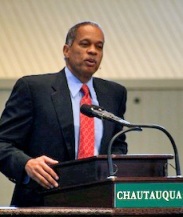
Walmart in Merida, Mexico
I’d like to call your attention to three stories that stood out for me yesterday as examples of high-quality journalism that tells you something important that you didn’t already know, that places isolated facts within a broader perspective, or both.
• First up is David Barstow’s remarkable New York Times story on Wal-Mart’s Mexican bribery scandal — a scandal that was known to few outside Wal-Mart before this weekend. Clocking in at a New Yorker-like 7,600 words, Barstow’s article documents corruption at every level of the company, from active bribery in Mexico to passive acceptance at Wal-Mart’s U.S. headquarters.
Given the complexity of the story, I thought the “Guide to People in This Article” was a nice touch. So was the inclusion of Wal-Mart’s full response as a stand-alone document.
The story is a tour de force with implications that will be playing out for some time to come. It’s also a reminder that there are certain types of public-interest journalism that can be carried out only by a high-profile, well-funded news organization with its own army of lawyers.
• Next is Meghan Irons and Beth Healy’s Boston Globe article on the financial crisis that threatens the Charles Street African Methodist Episcopal Church, a leading institution in Boston’s African-American community that is in big trouble over an ill-advised expansion project.
The church’s primary lender is another African-American institution, OneUnited Bank, which brought down the hammer in part as a reaction to its own problems related to the national mortgage crisis.
The story has been in the news for some time now, but Irons and Healy are the first to pull all the strands together in a way that makes sense, even though no one from OneUnited would talk with them on the record. It’s fleshed out with photos and a video of a recent protest by African-American leaders in front of OneUnited headquarters.
• Finally, I was driving home from work on Sunday when I heard a long (11:29) piece on NPR’s “All Things Considered” called “Poverty in America: Defining the New Poor,” which explained how Clinton-era welfare reform has resulted in a shift toward food stamps as the primary means by which the government provides assistance to poor families.
During the recession of the past several years, the number of Americans on food stamps has risen from about 30 million to about 46 million.
Particularly riveting was NPR’s interview with Vicki Jones, who recently wrote an op-ed piece for the Chicago Sun-Times on what it’s like to live on $60 a week in food stamps while going to chiropractic school full-time and supporting her 7-year-old son.
Although the clear message of the story, reported by Guy Raz, is that we are not doing enough for the poor, the piece also functions as an outstanding explainer, bringing into focus a number of issues that are poorly defined when used as debating points by partisans.
Thanks to the Times, the Globe and NPR, I know more today than I did 24 hours ago.
Photo (cc) by ruffin_ready and republished here under a Creative Commons license. Some rights reserved.

 This is a mistake that comes up over and over, and today’s offender is the Boston Globe. The headline on an
This is a mistake that comes up over and over, and today’s offender is the Boston Globe. The headline on an 
 Even a card-carrying secular humanist like me couldn’t help but be troubled that the Obama administration was ordering the Catholic Church to
Even a card-carrying secular humanist like me couldn’t help but be troubled that the Obama administration was ordering the Catholic Church to 